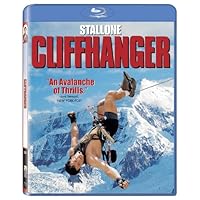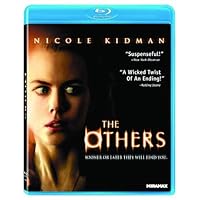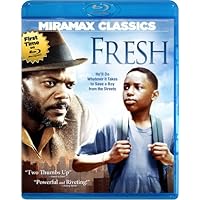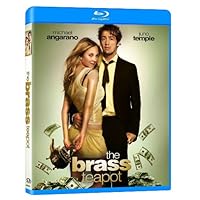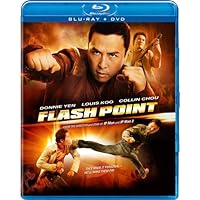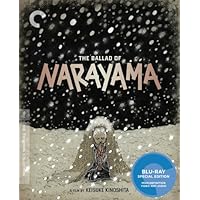 Quite a few Asian films Korean, Japanese, Chinese explore the meaning of old age and specifically the cycle of life. This is one of the great themes of this film. The essential fact of this movie is that, through custom (and religion), the parents who reach age 70 are to leave the society and meet their end on the top of the Mountain Narayama. In a sense, it is both frightening and sacred. The cycle of life continues with the younger generation.
Quite a few Asian films Korean, Japanese, Chinese explore the meaning of old age and specifically the cycle of life. This is one of the great themes of this film. The essential fact of this movie is that, through custom (and religion), the parents who reach age 70 are to leave the society and meet their end on the top of the Mountain Narayama. In a sense, it is both frightening and sacred. The cycle of life continues with the younger generation.Everyone who sees this provocative movie will talk about its striking visual beauty. But more importantly, it strikes a nerve how should society allocate its scarce resources. Ironically, the fact that the old are left to die by exposure is not necessarily a statement that the elders are not valued by the society. The old are valued...but they need to recognize their function in letting the young take their place. The act of death, therefore, becomes a sacred rite. This is very vividly presented in the last frames.
I am glad that this visually arresting film is now available in Blu-Ray. While the movie was remade by Imamura Shohei, I actually prefer the striking sets of this film over the more naturalistic settings of the other.
This is a thinking person's film. It also depicts in visual form a very primitive society, letting us have a picture of what the world must have looked like 10,000 years ago.This is the more beautiful of two adaptations of the same story. Director Keisuke Kinoshita used traditional Japanese Kabuki theater as visual inspiration for a stunning story of generational tension in a small village (the other adaptation of this story is the far more realistic and brutal The Ballad of Narayama ).
The plot involves three generations of a household: the aged Orin who is the matriarch of the household, her son Tatsuhei, and his son--a completely self-absorbed teenager--Kesakichi. The village tradition dictates that elderly parents are carried into the mountains and left there to die, so that the younger generations have a better chance to survive.
However this family problematizes tradition because Orin is in great health, as evidenced by her full set of teeth. Orin is eager to carry out the tradition, counting down the days until her trip to Narayama. But her son, Tatsuhei, is deeply attached to his mother and does not want her to die. Her Grandson, Kesakichi, is wretched and taunts Orin, regularly demanding that she make the trip to her grave. Kesakichi's comically bovine wife, Matsu, is excited for Orin's death because there will be more food for them once Granny's out of the way.
The story and color is beautiful and tragic. The highly stylized sets contribute to the sense of watching a stage production. Even with these layers to remove the viewer from the tragic events unfolding, this viewer was completely caught in the story.
As usual, the Criterion Collection edition comes with nice extras:
---New 4K digital master from the 2011 restoration, with uncompressed monaural soundtrack on the Blu-ray edition
---Trailer and teaser
---New English subtitle translation
---PLUS: A booklet featuring an essay by critic Philip Kemp
Buy The Ballad of Narayama (Criterion Collection) (1958) Now
Very good film with every scene (interior and exterior) done on a sound stage which gives it a make-believe kind of look, which works well with the extremely stylized nature of the film--it is done as if it were a kabuki stage play, although the story is from a novel.... This technique leads to very interesting scene transitions and unique lighting effects.... The story involves a tradition whereby people, upon reaching the age of 70, go to Narayama mountain to die-someone carries them up to the mountain and leaves them there in the presence of some mysterious god.... very, very sad overall.... It is interesting how different people think of the tradition: some think well of it, others joke about it, and one man is carried to the mountain kicking and screaming.... The mountain top is littered with senior citizen skeletons.... As far as the video quality, it is very, very good....the colors are terrific, most notably in the Autumn harvest scenes--very colorful.... The mono sound does the job well--the Japanese instrumentaion is very sparse, and the dialogue is clearly rendered.... highly recommended for fans of Japanese cinema....Read Best Reviews of The Ballad of Narayama (Criterion Collection) (1958) Here
A long time ago in Japan, there was a custom practiced in poor and mountainous regions during a time of drought or famine. That practice is known as "Ubasute", in which a relative carries an elderly family member to the mountain or a remote, desolate area to be left there to die.Because of the tough times and families were struggling to feed everyone, it was a custom that was mandated by feudal officials.
And the custom has been featured in Japanese folklore passed down from generation after generation. Songs about a relative carrying an elderly on their back, while the elderly would snap twigs, so the relative will no how to get back home.
The practice of Ubasute would be explored in the 1958 film "The Ballad of Narayama" (Narayama bushiko), written and directed by Keisuke Kinoshita ("Twenty-Four Eyes", "Morning for the Osone Family", "The River Fuefuki", to name a few).
The film was remade in 1983 by director Shohei Imamura, who showed a brutal depiction of how villagers were at the time, the Imamura is a film best known in the West especially for winning the Palme d'Or at the 1983 Cannes Film Festival.
But while the 1983 film receives a lot of attention, the 1958 Kinoshita film is remarkable on its own, as it is a kabuki-inflected version of a Japanese folk legend. Featuring beautifully designed sets and wonderful cinematic work from that golden age, it's one of the highlights in the oeuvre of Keisuke Kinoshita's cinematic career.
VIDEO:
"The Ballad of Narayama" is a 1958 film that looks gorgeous thanks to the restoration done in 2011. Colors look amazing, no flickering, there were light artifacts but I was amazed because the picture quality looked nearly pristine for its age. This is the best looking version of the film (released in the US) to date!
Presented in 1080p High Definition (2:35:1 aspect ratio), according to the Criterion Collection, this new digital master was produced from the 2011 restoration done by Shochiku studios and Imagica. For the restoration, a scan was created in 4K resolution on an Imagica IMAGER scanner from a new 35 mm interpositive wetgate printed from the original camera negative; the original negative could not be scanned directly due to excessive damage. The restoration work was then performed in 2K resolution.
AUDIO & SUBTITLES:
"The Ballad of Narayama" is presened in LPCM 1.0 monaural. The dialogue was clear through the center channel and I heard no pops, clicks or any problems during my viewing.
According to the Criterion Collection, the original monaural soundtrack was remastered at 24-bit from a sound positive. Clicks, thumps, hiss and hum were manually removed using Pro Tools HD. Crackle was attenuated using AudioCube's integrated workstation.
SPECIAL FEATURES:
"The Ballad of Narayama The Criterion Collection #645" comes with the following special features:
Trailer(3:26) The original Shochiku Japanese theatrical trailer for "The Ballad of Narayama".
Teaser (2:23) A teaser for "The Ballad of Narayama".
EXTRAS:
"The Ballad of Narayama The Criterion Collection #645" comes with an 24-page booklet with the following essay, "Abandonment" by Philip Kemp.
JUDGMENT CALL:
Family.
Filmmakers such Akira Kurosawa, Yasujiro Ozu, Mikio Naruse and Shohei Imamura are filmmakers who are well-known internationally for their films based on family and social dramas. From the parental responsibility of making sure that life is arranged for their children to the disconnect between children and their parents as they get older.
While filmmaker Keisuke Kinoshita was not as well-known internationally as the filmmakers I have mentioned, he was one of the busiest filmmakers in Japan directing over 40 films in 23 years and one of the more popular directors during the '40s through the '60s.
While Americans may know of Kinoshita's work through his film "Twenty-Four Eyes" (available on DVD from the Criterion Collection), his 1958 film "The Ballad of Narayama" is a film known for incorporating kabuki but also introducing many to the concept of "ubasute". But also the predecessor that inspired the 1983 Shohei Imamura version that would go on to win awards including the Palme d'Or at the 1983 Cannes Film Festival.
But while the 1983 is the version that most people know, the 1958 version is still a fantastic film and a classic that managed to incorporate Japanese culture such as kabuki (a classical Japanese dance-drama, but in this case, the music is what is utilized as a form of narration) in a film, but yet be appreciated by an international audience.
I enjoyed "The Ballad of Narayama" thanks to the wonderful performance by Kinuyo Tanaka as Orin, the 69-year-old matriarch who knows she will be turning 70 and that she will be taken to Mount Narayama to die. But for Orin, she doesn't see this as a death sentence. It's how others have died in the village when they turned 70 and the fact that they can join the Narayama God, it's something that she looks forward too. So, through this final year, she just wants to make sure that all is set for her son Tatsuhei (in getting remarried) and her new daughter-in-law Tamayan.
Meanwhile, we see the anguish of her son Tatsuhei. A man that very much loves his mother but knows that due to the custom of the village, even though his mother is healthy, he must take her up to Mount Narayama to die.
And its how Orin would convince him to forget about her. From giving a positive attitude that she is ready to die, to even going as far as to bash her teeth in, so he won't worry about her.
But the film is able to capture other situations that take place in the village. From what happens to a man who tried to steal and how his family is punished. To how another elderly man tries to fight with his son, as he does not want to go to Narayama.
The incorporation of Kabuki gives "The Ballad of Narayama" its unique feel but also seeing how beautiful and how vast the studio sets were. There are three moments that stick out in my mind. One features Orin trying to comfort her son and everything goes black and only a single light shines on them. Another scene is with Tatsuhei bringing his mother up to Mount Narayama and its amazing just to see how elaborate and how long these sets are. I was very impressed! But the third scene was quite scary to see how skeletons were laying on the mountain, as crows just sit and wait for one to die. I don't know if this is what people saw back then but I can imagine with many elderly taken up to the mountain to die, the sight of skeletons or one's belongings must have been heartbreaking.
As for the Blu-ray release, the restoration of this film by Shochiku Co., Ltd. was amazing. The film looks nearly pristine for its age and the colors that come out in the Blu-ray release is amazing. While there are light artifacts, with the 2K restoration and uncompressed monaural track, this is the best version of the film (released in the U.S.) to date. I wish there was audio commentary included or even a feature on Keisuke Kinoshita but you do get a trailer and a teaser plus a booklet.
While the Criterion Collection release was impressive and the best to come out in America thus far, I have to admit that I was hoping the Blu-ray release was similar to what was released in Japan back in October 2012. The Japanese Blu-ray release had a 4K digital restoration and it came with 38 minutes of special features, including a 100th anniversary of Keisuke Kinoshita half-hour feature for "The Ballad of Narayama".
Nevertheless, for its price (releases from the Criterion Collection with less special features are typically priced lower than those with more special features) and its quality, I was quite impressed by the overall Blu-ray release.
While most people are familiar with films such as Akira Kurosawa's "Ikiru" or Yasujiro Ozu's "Tokyo Story" (1953) which still resonates strongly even today among Japanese, "The Ballad of Narayama" may feature a custom that is no longer practiced but the situation in Japan among the elderly who feel they are inconveniencing their children still and committing suicide is still a problem in Japanese society.
"The Ballad of Narayama" is a beautiful, well-acted and also a heartbreaking film from filmmaker Keisuke Kinoshita about a custom practiced in Japan long ago. Bringing together kabuki and innovative and beautiful sets created in the golden age of Japanese cinema, "The Ballad of Narayama" is highly recommended!
Want The Ballad of Narayama (Criterion Collection) (1958) Discount?
The other reviewers covered this masterpiece of film art. In context of film as art and that art preceeds society, I believe it is poignant to write that in January 2013 the new Japanese Finance Minister Taro Aso said the elderly should be allowed to "hurry up and die" to save money on health care. Being generous of context, it was probably meant not to keep them alive against their will. Remember the end of Solyent Green with Edgar G Robinson and that beautiful music Peer Gynt Suite No.1? What was your feeling when you saw this portion of the film? Our current society and culture values practical and utilitarian constructs. How soon before we catchup to our future?One last thought from the film is duty. Duty, the web of interconnectedness and karma, to ourselves, to family, to our society. Does the protagonist reveal her one inperfection being driven by what other people think rather than accepting duty for its own sake?


